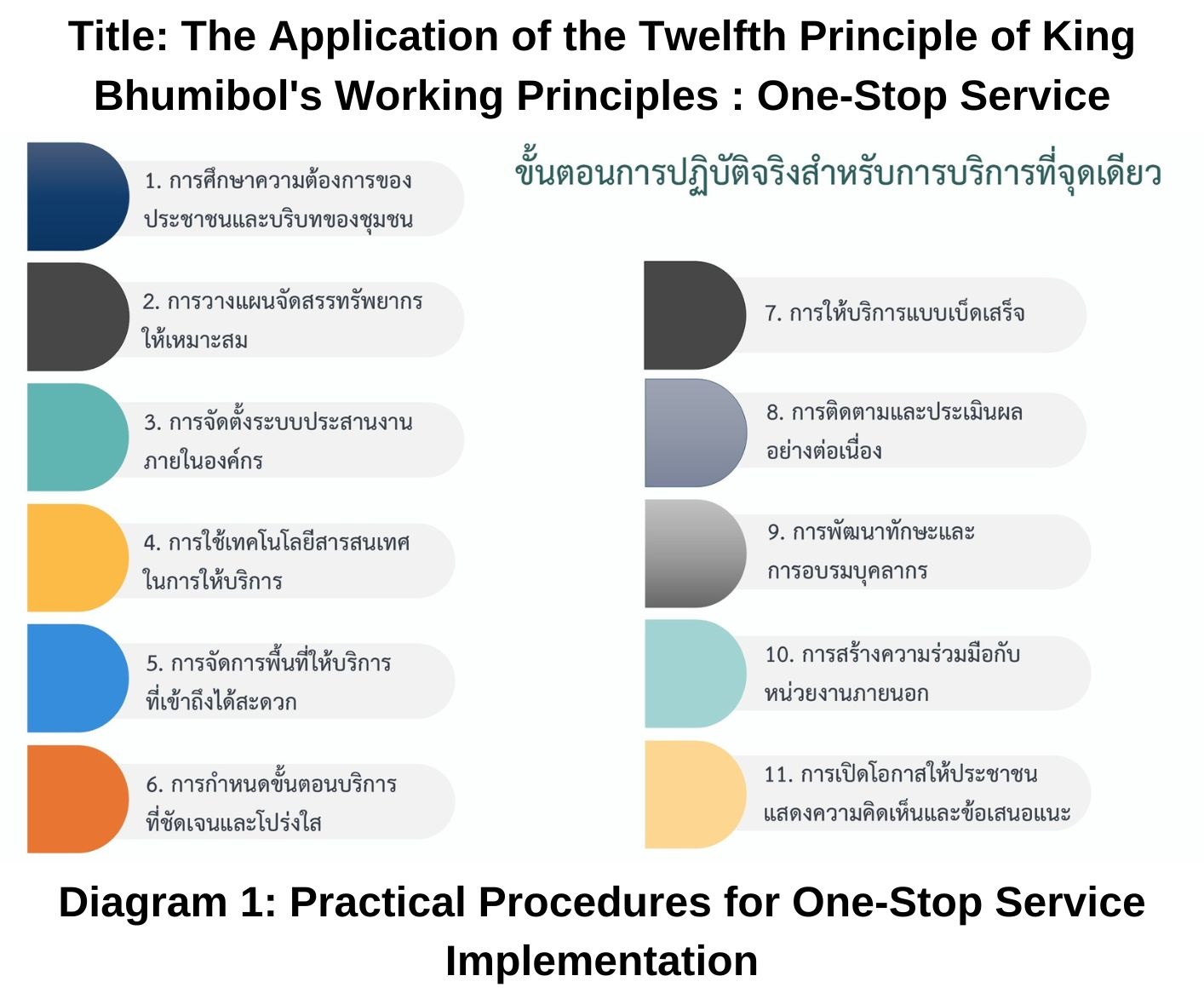The Application of the Twelfth Principle of King Bhumibol's Working Principles : One-Stop Service
Keywords:
Application, The Twelfth Principle of King Bhumibol's Working Principles, One-Stop ServiceAbstract
This academic article examined the application of the 12th royal working principle, One Stop Service. The findings revealed that the One Stop Service approach focused on facilitating public access to services provided by government agencies or organizations. By reducing the complexity of operational procedures and consolidating various services in a single location, this method allowed citizens to receive comprehensive services without needing to visit multiple places or navigate convoluted processes. This principle aligned with modern management concepts that emphasized transparency, efficiency, and user satisfaction, demonstrating a deep understanding of public needs and social contexts. It was evident that His Majesty King Bhumibol Adulyadej The Great prioritized the establishment of a system that enabled the public to access services easily and conveniently, free from complicated steps or uncoordinated processes. The One Stop Service was not merely about streamlining operations but also about fostering trust in the public service system. Furthermore, it enhanced confidence in the effectiveness and professionalism of service providers. The practical application of this royal principle in contemporary contexts took various forms. It began with analyzing the needs of the public in specific areas to comprehend the nature of their problems and expectations. Subsequently, service centers that integrated related functions were established in a single location. These centers were further supported by information technology systems that facilitated operations, such as document verification, result notifications, and service status tracking. In summary, the One Stop Service was a transformative approach that not only simplified service delivery but also built trust, strengthened public confidence in governmental processes, and ensured that services were accessible, efficient, and responsive to the needs of the people.
References
คณะกรรมการอำนวยการศูนย์ราชการสะดวก. (2567). คู่มือการรับรองมาตรฐานการให้บริการของศูนย์ราชการสะดวก. กรุงเทพฯ : สำนักงานปลัดสำนักนายกรัฐมนตรีและสำนักงานคณะกรรมการพัฒนาระบบราชการ.
คณะอนุกรรมการขับเคลื่อนเศรษฐกิจพอเพียง สำนักงานคณะกรรมการพัฒนาการเศรษฐกิจและสังคมแห่งชาติ. (2550). ประมวลคำในพระบรมราโชวาทพระบาทสมเด็จพระเจ้าอยู่หัวภูมิพลอดุลยเดช ตั้งแต่พุทธศักราช 2493 - 2549 ที่เกี่ยวข้องกับปรัชญาของเศรษฐกิจพอเพียง. พิมพ์ครั้งที่ 5. กรุงเทพฯ : กลุ่มงานเศรษฐกิจพอเพียง สำนักคณะกรรมการพัฒนาการเศรษฐกิจและสังคมแห่งชาติ.
ชิสา กันยาวิริยะ และสิรินทร์ กันยาวิริยะ. (2567). การจัดการความเสี่ยงท่ามกลางความเปลี่ยนแปลงตามหลักปรัชญาหลังนวยุคสายกลาง. วารสารสถาบันพอดี, 1(4), 12-22.
ณฐพนธ์ คงศิลา. (2565). พุทธบูรณาการเพื่อส่งเสริมการบริหารจัดการงานของกรุงเทพมหานคร โดยการมีส่วนร่วมของผู้นำชุมชน. วารสารนิสิตวัง, 24(2), 19-28.
มงคล รื่นเรืองฤทธิ์. (2559). ความพึงพอใจของประชาชนต่อการให้บริการงานช่างของเทศบาลนครพระนครศรีอยุธยา. สารนิพนธ์รัฐประศาสนศาสตรมหาบัณฑิต. บัณฑิตวิทยาลัย : มหาวิทยาลัยสยาม.
ศูนย์วิจัยและนวัตกรรม. (2565). รายงานผลประเมินความพึงพอใจ ของประชาชนต่อการให้บริการขององค์การบริหารส่วนท้องถิ่น กรณีศึกษา : องค์การบริหารส่วนตำบลโละจูด อำเภอแว้ง จังหวัดนราธิวาส ประจำปีงบประมาณ 2565. ศูนย์วิจัยและนวัตกรรม : มหาวิทยาลัยนราธิวาสราชนครินทร์.
สำนักงานคณะกรรมการพิเศษเพื่อประสานงานโครงการอันเนื่องมาจากพระราชดำริ (สำนักงาน กปร.). (2559). หลักการทรงงานในพระบาทสมเด็จพระบรมชนกาธิเบศร มหาภูมิพลอดุลยเดชมหาราช บรมนาถบพิตร. พิมพ์ครั้งที่ 11. กรุงเทพฯ : สำนักงาน กปร.
สำนักงานคณะกรรมการวิจัยแห่งชาติ. (2551). ธรรมนูญชีวิต 9 ประการ ตามรอยพระยุคลบาท. กรุงเทพฯ : อมรินทร์พริ้นติ้งแอนพับลิชชิ่ง.
สุดาภรณ์ อรุณดี และคณะ. (2565). การบริการภาครัฐแนวใหม่ กรณีศึกษา : การให้บริการประชาชน (One Stop Service) บนสถานีตำรวจนครบาล. วารสาร มจร พุทธปัญญาปริทรรศน์, 7(1) 31-42.
อรพรรณ นางแล. (2562). การให้บริการของรัฐตามมาตรฐานชั่วคราวในการแก้ไขปัญหาแรงงานต่างด้าวและการค้ามนุษย์ ในรูปแบบศูนย์บริการเบ็ดเสร็จ (One Stop Service) กรณีศึกษา จังหวัดขอนแก่น. วารสารแสงอีสาน, 16(2), 447-460.
Bauman, Zygmund. (1996). Postmodern Ethics. Oxford : Blackwell.
Catherine Powell. (1999). Symposium in celebration of the fiftieth anniversary of The Universal Declaration of Human Rights, introduction : Locating Culture, Identity, And Human rights. Columbia Human Rights Law Revier, 30(2), 202-206.
Marie-Luce PAVIA. (1999). La decouberte de la dignite de la personnehumaine. La Dignite de la PersonneHumaine. Paris : Economica.
Mill, J.S. (1951). Utilitarianism, Liberty and Representative Government.New York : E.P. Dutton and Company Inc.
Thomas Wurtenberger. (1971). Humanity as an element in Penal Law. Law and state, 4, 106-113.

Downloads
Published
How to Cite
Issue
Section
License
Copyright (c) 2024 Institute of Sufficiency Journal

This work is licensed under a Creative Commons Attribution-NonCommercial-NoDerivatives 4.0 International License.



